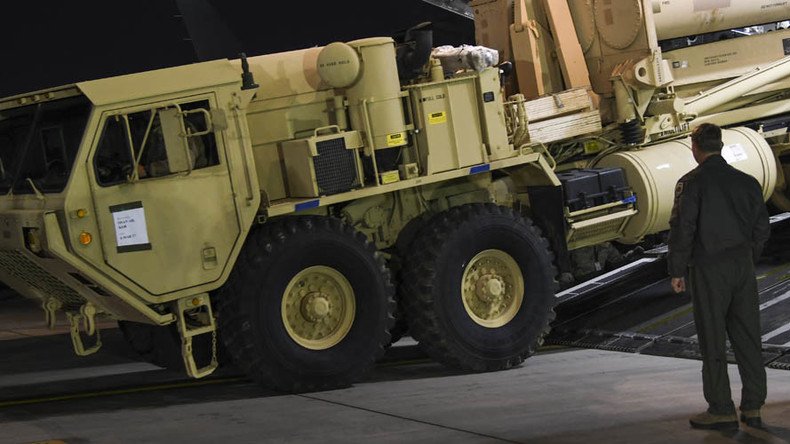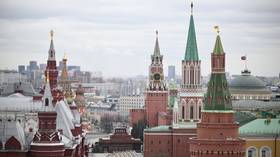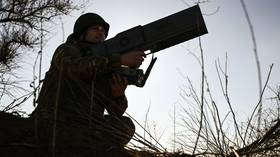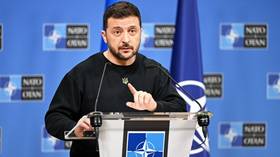US to conduct another THAAD test amid growing Korean Peninsula tensions

The US Missile Defense Agency (MDA) has confirmed that it will soon carry out another test of its THAAD system to examine the hardware’s effectiveness against potential ballistic threats, Reuters reports.
A Terminal High Altitude Area Defense (THAAD) flight test will be conducted by the MDA from the Pacific Spaceport Complex Alaska “in early July,” the agency confirmed to Reuters after it broke the news of the upcoming test.
THAAD test would “detect, track and engage a target” with an interceptor rocket, MDA spokesman Chris Johnson told Reuters.
“The test is designated as Flight Test THAAD (FTT)-18,” Johnson added without elaborating.
US & S. Korea launch tactical missiles to show capabilities to North Korea https://t.co/d794oXKlTgpic.twitter.com/qq7LLcrK1Z
— RT (@RT_com) July 5, 2017
Earlier on Friday, two US officials told Reuters that the US military will test its THAAD batteries in the “coming days” in response to a North Korean rocket launch on July 4. The anti-missile test, however, was planned months in advance, officials claimed.
One of the anonymous sources noted that it will be the first THAAD test against a simulated attack by an intermediate-range ballistic missile (IRBM).
N. Korea’s 1st ICBM launch shown on state TV (VIDEO) https://t.co/udotcPB3iIpic.twitter.com/kk6QtgWV7A
— RT (@RT_com) 5 July 2017
Since 2006, the THAAD batteries have completed 13 flight tests with a reported 100 percent success rate. Produced by Lockheed Martin, THAAD provides the capability to intercept and destroy ballistic missiles inside or outside the atmosphere during the final phase of flight.
The batteries are now being deployed to South Korea to tackle potential threats emanating from Pyongyang. In Korea, the 35th Air Defense Artillery Brigade, subordinate to the US Eighth Army, would operate the system.
On Tuesday, North Korea conducted the latest test of its missile technology. The Hwasong-14 missile, which allegedly flew for a distance of 933km (580 miles), reaching an altitude of 2,802km (1,741 miles) at the peak of the 39-minute flight, passed all the technical characteristics and requirements to be deemed an ICBM, North Korea announced.
Russia, China: N. Korea must freeze nuclear activities, US halt THAAD deployment https://t.co/rzcmFi0N9Bpic.twitter.com/Rydu9tdo3r
— RT (@RT_com) 4 July 2017
While the US and its regional allies insist that the rocket fired was indeed an ICBM, the Russian military has expressed doubts about the technical characteristics of the rocket. The Russian Defense Ministry, which tracked the rocket from the onset, insists that all data points in the direction of an IRBM.
As the US does not rule out potential military action against North Korea to annihilate its nuclear threat, on Wednesday, in a show of force, South Korean and American forces on the Peninsula launched surface-to-surface tactical missiles into neutral waters.
To prevent any military confrontation, both China and Russia insist on a peaceful resolution to a conflict, while urging the US and South Korea to reconsider the THAAD deployment to the Peninsula. Moscow and Beijing view THAAD as a threat to the balance of power in the region and as a direct threat to their national security.
N.Korea’s nuclear question must be solved through dialogue, not provocations – Russia to UNSC. LIVE: https://t.co/lAJVOK74sQpic.twitter.com/yIJi1i50Nt
— RT (@RT_com) 5 July 2017
Instead of the military buildup course that the US is actively pursuing in the region, Russia and China have offered their own roadmap out of the stalemate.
The joint initiative envisions the implementation of ‘double freezing,’ where missile and nuclear activities by the DPRK would be halted if the United States and the Republic of Korea stop their large-scale joint drills. At the same time, the course of action envisions ‘parallel advancement’ of “denuclearization” and the creation of “peace mechanisms” of the Korean Peninsula.
Moscow’s part of the initiative proposed a “stage-by-stage Korean settlement plan.” Russia hopes that North Korea will voluntarily declare a “moratorium on the testing of nuclear explosive devices and ballistic missile tests” while the US and its allies refrain from further military drills and other provocations.
At the same time, the initiative urges the “conflicting parties [to] begin talks and assert common principles of their relations,” based on the non-use of force and the renunciation of aggression.













